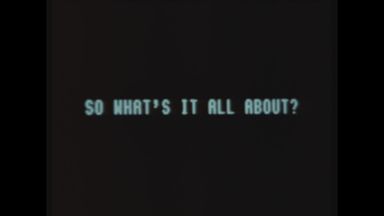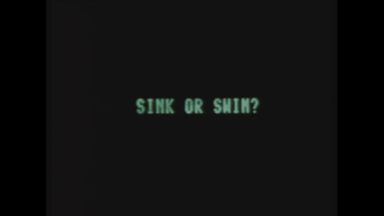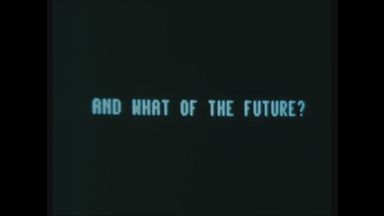The Silicon Factor
3. And What of the Future?
Clips from this programme
Opening Titles: An industrial robot builds the series title. Graphic design by Charles McGhie; music by Roger Limb at the BBC Radiophonic Workshop
Duration: 00:33Presenter Bernard Falk reflects on America's history of picking up good ideas from Europe and developing them into mass produced products and services. The computer is the latest example.
Duration: 00:56Falk begins to look at the future effect of 'the new technology' on all our lives by riding the newly opened Washington Metro. Fully computerised from ticket machine to trains. It is efficient but employs very few people.
Duration: 04:24In Texas (1979) the Winn Dixie supermarkets are using newly developed barcodes to track and price goods at the tills and to streamline the back office activities: ordering, stock control and so on. Again, efficiency brings job losses but the company is much more efficient
Duration: 01:51In New York in 1979 a glimpse of the office of the future at Citibank which also has the new cash dispensers outside. Networked workstations allow shared information for example for calendars and scheduling meetings. word processors create documents and send electronic mail across the country in seconds, locally distributed data servers automate a range of office systems. Again, greater efficiency, higher job satisfaction but at the price of job losses.
Duration: 04:03By contrast in Europe the debate has been about job losses rather than the adoption of new technology. White collar unions are worried - especially in Britain and Germany.
Duration: 01:54New products like the Philips laser disc (which can hold huge amounts of information) offer powerful new techniques will affect clerical jobs especially.
Duration: 01:18In the telecommunications and postal industries we see new technology automating jobs previously done by people and new electronic exchanges are replacing electromechanical exchanges. Word processing and electronic mail - especially in businesses - threaten the traditional typing pool and postal services.
Duration: 03:14New jobs lie in the information technology industries and in more automated production systems in manufacturing. Jobs will change and new attitudes will be needed. Comments come from leaders in IBM, GKN and Lucas Industries. Philip Reasbeck of Lucas says the most important need is for retraining people and within the education system itself, preparing people to understand new technology
Duration: 01:22Computer in education - some educational advantages are claimed for toy-like 'Speak and Spell' machines in a UK school and in America early home computers are appearing in classrooms to help with english and maths, the simple programs written by the teaching staff.
Duration: 04:22In Edinburgh children are using and programming robotic machines in the University's laboratory. Claims of computer programming becoming the 'New Latin' for training the mind.
Duration: 02:16Expert systems' in professional environments could be affecting highly trained jobs - such as in law or medicine. An expert system in a scottish hospital is helping junior doctors ask the right questions when diagnosing the source of acute abdominal pain. It helps training but many professionals don't like it.
Duration: 02:43Computer aided design helps architects and other highly thought of professions. Christopher Evans and Edwin Nixon of IBM predict that the jobs that will survive are in the creative and services sectors and the 'people' industries - like hairdressing, nursing and care. Barrie Sherman of ASTMS talks of the need to rethink the working week and to train for people-to-people jobs.
Duration: 05:05Computers in Germany help in the fight against terrorism using technologies such as face recognition in crowds but Barrie Shermann warns about the danger to human rights and privacy when 'nasty people' control the technology and information about everyone is held in linked databases.
Duration: 01:47We are only just understanding the implications of the innocent-looking silicon chip for work and society. The transition may well be painful - leading to unfairness and social disruption - but also to new developments of new goods and services and improvements in such things as medicine. The transition requires vigilance, wise handling and much greater public awareness.
Duration: 03:07The Silicon Factor
1. So What's It All about?
First broadcast: 19th March 1980
Duration 39:29
The silicon chip, unnoticed by most of us a few years ago, is now something everybody has heard about, few understand and many are beginning to fear. Is it really the basis for a revolution as profound as the industrial revolution? Bernard Falk takes a layman's view of what the silicon chip is, how it's made and works. From a Chicago millionaire's home to a Birmingham car-test track, and from a psychiatric hospital in Scotland to a Swedish factory, he looks at how the new technology is being used and what it could do in the future. Film editor JOHN LYTE Producer DAVID ALLEN.
2. Sink or Swim?
First broadcast: 26th March 1980
Duration 39:10
Is British industry falling behind in its use of silicon chip technology? By using microelectronics in its products or in production, a company can improve its competitiveness enormously. But to ignore the opportunities offered by the chip could lead to disaster when other - largely foreign - competitors are forging ahead. And what of the effects on the workforce if a company 'goes micro ' ? Are our fragile industrial relations capable of adjusting to the changes the new technology will force on us? Bernard Falk reports from Holland, Sweden and Norway to put the British position into perspective. Director ROBERT ALBURY Producer DAVID ALLEN
3. And What of the Future?
First broadcast: 2nd April 1980
Duration 39:32
How will the silicon chip affect the quality of our lives and our attitudes to work? Starting in America, Bernard Falk visits places already using the new technology to find out what could be in store for white collar, blue collar and professional workers in the next decade. What kinds of jobs will change or disappear? Are there areas where employment will increase? What will be the effects on the professions? How must our attitudes change if we are to enjoy the benefits of this new revolution and not suffer its worst effects? Production DAVID ALLEN and ROBERT ALBURY
Now playing


















